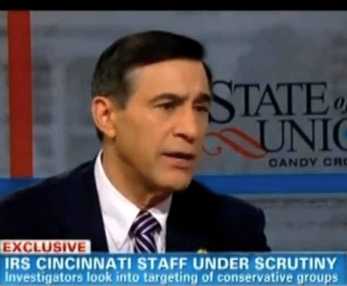It’s become routine for Republicans in Washington to: a) discover an impropriety; then, b) examine if the president has any connection to it.
Since his re-election, President Obama continues to deal with the fallout from three controversies: the deaths of four Americans at Benghazi, the questionable AP phone taps by the Department of Justice and the IRS scandal.

Back in the 70s, I remember tuning in to watch the Watergate hearings. This might come as a surprise to some, but I actually believed President Nixon knew nothing of the break-in at Democratic headquarters. The whole thing just seemed too preposterous to me that a sitting president would commit such an overreach of power.
June 23, 1971, the day John Dean testified, changed my mind. As special counsel to President Nixon, Dean took exhaustive notes of his conversations with the president and laid out illicit detail after detail over days of testimony before Watergate prosecutors. The hearings not only ended with the indictment, trial and conviction of 43 individuals including officials such as John Ehrlichman and Bob Haldeman, but the resignation of Richard Nixon.
That was a scandal.
Given the historical back-story I offered yesterday on the IRS scandal – Citizens United, 501(c)(4)s and budget cuts at the IRS – does the flagging or targeting of political groups for tax exempt status by the Cincinnati IRS field office rise to level of a scandal?
According to Dictionary.com, a “scandal” is defined as 1) disgraceful or discreditable action, circumstance, etc.; 2) an offense caused by a fault or misdeed; 3) damage to reputation; public disgrace; 4) defamatory talk; malicious gossip; 5) a person who conduct brings disgrace or offense.
You don’t have to go beyond the first definition to clearly see that, yes, the actions by some at the IRS were, in fact, disgraceful. And when you add the fact that government institutions are supposed to be trustworthy, it’s more than disgraceful; it’s reckless and misguided and demands action.
Sadly, one of the by-products of Watergate and other such scandals is an abiding cynicism by many that whenever a new outrage comes to light many first reactions are: a) “See, they’re all corrupt!”; and b) the president either had a direct hand in it, or knew what was going on.
(Note: This writer does not subscribe to the views of conspiracy sites that propagate more myth than fact. So don’t send me links to www.obamaknewforsure.com, etc. If any reader believes that he or she has unshakable, verifiable evidence that the president participated in the IRS scandal, they should report directly to the House Oversight and Government Reform Committee, attention: Chairman Darrell Issa.)
“The bottom line is [IRS officials] used key words to go after conservatives,” Issa said recently on Meet the Press. “There has to be accountability for the people who did it.”
And he’s right. We need to identify those individuals who implemented this scheme and put policies in place to prevent this from happening again. Unfortunately, Issa’s zeal took on Watergate-like proportions when he added, “… there’s got to be accountability for people who were telling lies about it being done.”
Mr. Issa’s suggestion is that, like Watergate, there must be a web of conspirators behind this operation. In fact, SenatorMitch McConnell’s latest campaign ad draws a straight line from President Obama, to the IRS, to Nixon and Watergate. AnInspector General’s Report says that this is simply not the case.
While I have read the 54-page report (finding a detailed timeline of events particularly interesting), Washington Post reporter Ezra Klein (May 14) – who focuses on domestic and economic policymaking – offers a clear and concise analysis. In part, it reads:
“In the summer of 2010, in response to a huge surge in 501(c)(4) applications and media stories that some of these groups were illegally acting like political organizations, a group of IRS officials developed inappropriate criteria for identifying overly politicized 501(c)(4)s applicants. Those criteria included looking for the words ‘tea party’ or related terms. In July 2011, the director of the IRS told them to knock it off and use more politically neutral criteria that focused on the activities of the group rather than the name or ideology of the group.
“In January 2012,” Klein writes, “that same group of IRS officials goes rogue and changes the test back without getting management approval. According to the IG report, ‘they believed the July 2011 criteria were too broad.’ They’re found out three months later and, in May 2012, a new IRS director again demands the test is revised to ‘more clearly focus on activities permitted under the Treasury Regulations.’ That’s the test the IRS is using now, and the IG seems comfortable with it. …
“Much of the report is about confusion, incompetence, and unacceptable delays in the IRS unit that manages questionable 501(c)(4) applications. There’s no allegation here of politicization. But it’s nevertheless unacceptable:
“Many organizations waited much longer than 13 months for a decision, while others have yet to receive a decision from the IRS. For example, as of December 17, 2012, the IRS had been processing several potential political cases for more than 1,000 calendar days. Some of these organizations received requests for additional information in Calendar Year 2010 and then did not hear from the IRS again for more than a year while the Determinations Unit waited for assistance from the Technical Unit.
“For the 296 potential political cases we reviewed, 33 as of December 17, 2012, 108 applications had been approved, 28 were withdrawn by the applicant, none had been denied, and 160 cases were open from 206 to 1,138 calendar days (some crossing two election cycles).
“Those aren’t reasonable delays,” Klein concludes. “Some of the ‘letters requested that the information be provided in two or three weeks (as is customary in these letters) despite the fact that the IRS had done nothing with some of the applications for more than one year.’ Imagine you’re the director of a hopeful 501(c)(4) that applied to the IRS a year ago, got no response, and then all of a sudden you receive a letter demanding tons of information within two or three weeks. It’s absurd.
“Some of the information the IRS requested was also inappropriate, and could’ve revealed donor information that the 501(c)(4) designation is designed to keep secret. Again, quoting the IG report: ‘The Determinations Unit requested donor information from 27 organizations that it would be required to make public if the application was approved, even though this information could not be disclosed by the IRS when provided by organizations whose tax-exempt status had been approved.’
“The key question,” Klein points out, “related to the political test remains: Why hasn’t anyone been fired? It’s not definitive whether there’s any evidence that the IRS employees who created the tea-party-focused test and then recreated it after the director objected did so for political reasons. It certainly seems possible. And even if their actions were entirely non-political there was a lot of incompetence and a bit of insubordination.”
New acting IRS Commissioner Daniel Werfel, who worked at the Office of Management and Budget for both Republicans and Democrats, vowed to get to the bottom of all issues hanging over the IRS and do whatever is necessary to hold individuals accountable.
Now, we have a new audit that finds that the IRS spent $4.1 million on a single conference. Let’s see what Werfel does about this one.
Returning to the questions I originally posed in yesterday’s commentary:
What happened?
According to the IG report, confusion and gross incompetence led to delays in processing tax exempt status of some groups. Groups were wrongly targeted based on political terms such as “Tea Party,” “9/12 Project,” etc. While the IG report finds that there was no politicization, the actions were wrong.
Who’s responsible?
According to the IG, a group of IRS officials in Cincinnati, where the processing of 501(c)(4) applications are processed, are responsible.
Is there any evidence of a connection between the actions of these IRS officials and the White House?
To date, no evidence has been uncovered by the Inspector General or Representative Issa’s House Oversight and Government Reform Committee to prove a wider conspiracy behind the scandal. I have found no evidence suggesting a White House cover-up appearing on The Fact Checker,Politifact.com, FactCheck.org, or Open Secrets.org – all reputable watchdog organizations.
So, is the IRS issue a scandal or a reality show?
Sadly, it’s both, and remains the preeminent distraction from the real business Washington should be engaged in: a budget and a long term plan to deal with the debt, for starters.
TOMMOROW – conclusions.
Comments











